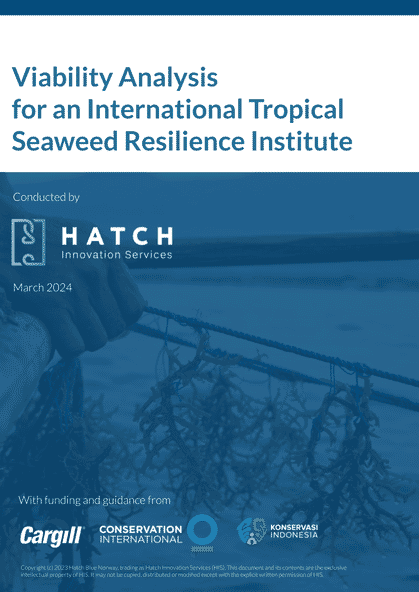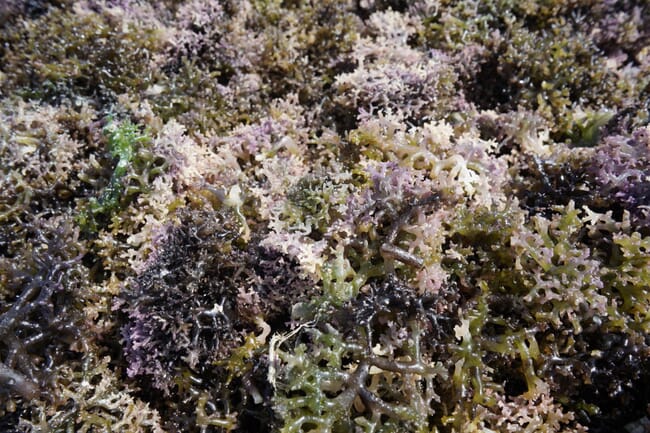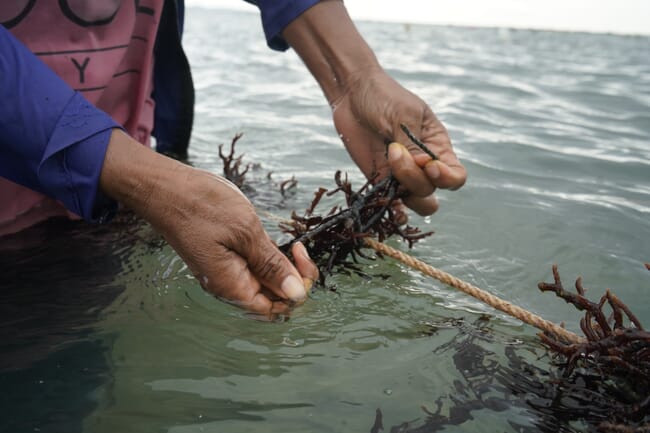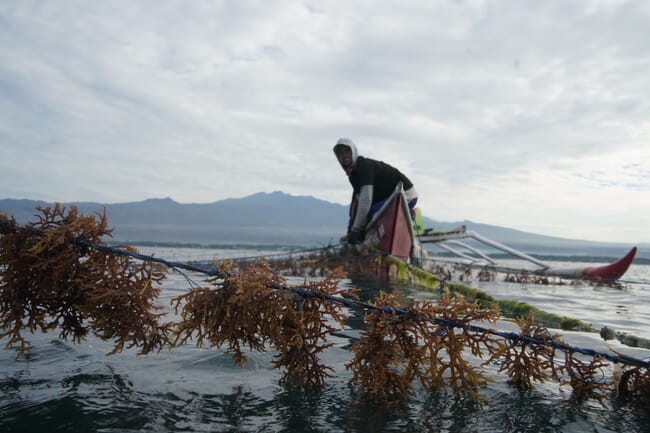
© Hatch Innovation Services
The global seaweed community has long supported the need for an international breeding institute focusing on applied research into the preservation, development, and distribution of high-quality improved strains of tropical seaweeds.
A newly commissioned report, conducted by Hatch Innovation Services funded and supported by Cargill, Konservasi Indonesia, and Conservation International, provides a future roadmap for how the global seaweed community can collaborate to support the development of such an institute.
The need for seed
Tropical seaweed aquaculture, and in particular the farming of eucheumatoids, has emerged as a major industry in the last 50 years, with the rise of carrageenan as a global commodity. Employment in the sector has created a lifeline for numerous coastal communities in tropical developing countries. While the demand from established markets is still growing, tropical seaweeds can provide more sustainable biomass for numerous other low-carbon value chains.
However, seaweed farmers face pressing challenges, as the yields of the most important species - Kappaphycus alvarezii and Eucheuma denticulatum - have been decreasing in the most established producing regions across the Coral Triangle, as well as in farming hotspots outside Southeast Asia, such as Tanzania.

Ice-ice disease, shown above, is a condition which results in bleaching and disintegration of seaweed biomass © Vicente Covarrubias
This decline has been induced by diminishing genetic diversity in the farmed species, an increased susceptibility to diseases, and the impacts of climate change. When Hatch undertook its previous in-field survey in 2022 across Indonesia, the Philippines, and Malaysia, it became clear that pretty much all farmers struggle with access to quality seed material.
“Across all regions I visited, it was shocking to witness how the lack of quality seed supply impacts established seaweed farming communities and how there are such limited efforts to address this issue," says Karlotta Rieve, project manager at Hatch Innovation Services.
This sentiment is echoed by RA Narayanan, head of ocean AgTech at Sea6 Energy and a member of the project’s steering committee: “In Bali, the birthplace of tropical seaweed farming in Indonesia, today we have only one, or just a few, varieties which vegetatively propagate and they are falling apart,” he notes.
“We have a critical window of approximately five to 15 years to transition from the current state of the industry to where we envision it needs to be,” adds Alan T. Critchley, research fellow at Canada’s Verschuren Centre for Sustainability in Energy and Environment, who was also on the steering committee.
The new report identifies strategic priorities and recommendations for an international tropical seaweed resilience institute by drawing on lessons learned from resilience centre initiatives for numerous land-based crops.

© Vicente Covarrubias
Global collaboration to ensure long term resilience
The study included input from more than 50 key players from the tropical seaweed community, as well as international crop centre experts, and highlights five key strategic focus areas that need to be addressed urgently:
- Seed banking and collection of native genetic material
- Breeding and crop improvement to develop climate-resilient and productive strains
- Seed material multiplication and distribution for equitable access to farmers
- Capacity building and extension services to disseminate knowledge from researchers to farmers
- Developing regulatory frameworks and industry standards to support the scaling of the industry
With strategic partnerships, stakeholder engagement, and open access at its core, an international institute that disseminates knowledge, seed material and capacity building will help the global, tropical seaweed industry to achieve its full potential.
The report notes that several countries – such as Indonesia, the Philippines, Malaysia, Brazil, and Madagascar - already have seaweed laboratories and committed seaweed researchers that could act as satellite stations of an international umbrella organisation. The institute should seek partnerships and work with governments to upgrade existing research facilities and invest into new seed banking and crop improvement programs.
Beyond funding support from government and international development agencies, the role of industry players, namely the downstream processors who depend on a steady seaweed supply, has been recognised as an important one.
“We need something where the industry can actually channel the money so we can have seaweeds in the future,” explains Valeria Montalescot, seaweed specialist at Cargill.

© Vicente Covarrubias
By fostering international collaboration, promoting best practices, and ensuring long-term funding for a network of regional satellite stations, such an umbrella organisation for tropical seaweed resilience has the potential to transform the future of seaweed farming.
“For CI Ventures, tropical seaweed is one of the priority sectors for our investment in Asia Pacific (regionally), and for our ocean investment (thematically). Supporting a Tropical Seaweed Resilience Institute is closely aligned with our investment strategy, aiming to achieve enhanced climate resilience for coastal communities, yield improvement, increased incomes, and other impact targets,” explains Satya Reza Faturakhmat, a sustainable investments manager that works with CI Ventures, the investment arm of Conservation International.
A multi-stakeholder approach
The launch of the report marks a significant milestone in the journey towards establishing the Tropical Seaweed Resilience Institute (TRSI) - which is currently the organisation’s working title.
"We believe that the findings of this report will serve as a catalyst for actions, inspiring stakeholders to unite in support of the institute," Rieve reflects.
Looking ahead, Rieve hopes that the report will ignite a process of consultation, objective alignment, and collaboration among stakeholders to define the mission and strategic trajectory of the TSRI.
In order to achieve these goals, there are two key initiatives on the horizon:
Facilitating stakeholder engagement and ideation workshops as part of the Tropical Phyconomy Coalition Development (TPCD) initiative, drawing participation from researchers, industry, governmental bodies, NGOs and potential backers
Establishing an elected, international steering committee comprising a diverse array of stakeholders to oversee the initiative's direction, supplemented by subcommittees tasked with exploring specific themes identified during the workshops
Acknowledgements
The report received funding from Cargill, which is an important value chain player in this sector, and Conservational International and Konservasi Indonesia through the Global Fund of Coral Reefs.
A diverse steering committee was vital in the compilation of the report. This included Valeria Montalescot (Seaweed Specialist, Cargill, France), Michael Y. Roleda (Professor, University of the Philippines Marine Science Institute), Alan T. Critchley (Research Fellow, Verschuren Centre for Sustainability in Energy and Environment, Canada), R A Narayanan (Head of Ocean AgTech, Sea6 Energy, India) and Burhanuddin Zein (Fisheries and Aquaculture Program Manager, Konservasi Indonesia).
The full report can be downloaded here.
For further inquiries or to learn more about the Tropical Seaweed Resilience Institute, please contact Karlotta@hatch.blue




